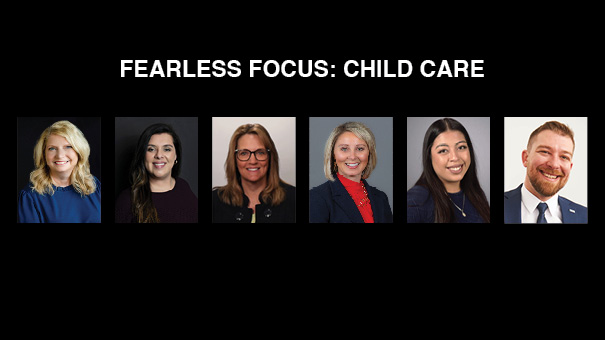Fearless Focus to feature discussion on child care challenges, solutions

Issues with availability and affordability plague Iowa’s child care system. In recent years, the issue has been seen by many as a business issue: If workers cannot afford or find available child care, they can’t work.
Adding more fuel to the fire, school districts that can’t find enough teachers are considering or have moved to four-day weeks, leaving working parents concerned about finding available child care on days when school is not in session.
All of this will be part of a discussion during our next Fearless Focus, “A look at solutions to Iowa’s child care challenges.” The virtual event will be held from noon to 1 p.m. on June 20. Registration is free and open to anyone.
In this discussion, we’ll talk to those working to change the trajectory of child care in Iowa through unique policy, business and community solutions.
Ahead of the event, we asked each speaker: What’s one solution or idea you’ve seen that helps address child care availability or affordability in Iowa?

Deann Cook, president and CEO, Iowa Women’s Foundation:
In working with over 80 communities across Iowa, the Iowa Women’s Foundation has learned that local solutions driven by dynamic partnerships of business leaders, child care providers, policymakers and families are the most successful way to increase the availability and affordability of child care. Community members are the most knowledgeable about the opportunities and strengths they can leverage to address child care challenges. The first step is understanding the specific issue to be solved. The second is building a local coalition that can work together to guide solutions. The critical step is investment through public-private partnerships to build the resources required to sustain the child care infrastructure needed to serve the local area. Public-private partnerships are a key driver of success because they recognize quality, affordable child care is necessary for a community to thrive. Collaborative leadership and shared investments speak to that priority.

Bethany Davis, vice president – early childhood, Oakridge Neighborhood:
The Shared Visions Preschool program provides quality child development programs for at-risk children, including at our Oak Academy preschool. The program makes child care more accessible for income-restricted parents who may not be working but are taking steps to become self-sufficient. Their children can receive full access to day care at qualifying facilities when parents have a disability, do not have a home, or are actively looking for a job or participating in classes like English language or citizenship. This is game-changing support for parents who are trying to build a better life for their families, and we are proud that Oak Academy is one of the few early enrichment programs in the area that can provide this benefit.

Teresa Hovell, benefits manager, Vermeer Corp.:
Acknowledging the challenges of working parents, particularly women, has been invaluable in moving the conversation of affordable and accessible child care forward. The impact to the already tight Iowa workforce is staggering, with families choosing between working and child care. Businesses are starting to step up in a variety of ways to help their team members, from flexible work arrangements to on-site child care centers. Like the parents who are balancing parenting with the workplace, businesses are starting to balance the workplace with parenting.

Renee Hansen, external relations manager, Sukup Manufacturing Co.:
Statewide grant funding enables businesses to invest in child care options for their employees. Sukup has experienced positive outcomes by partnering with child care facilities in Mason City and Clear Lake, securing child care slots for its employees. Additionally, state grants have facilitated the construction of a new child care center in Sheffield, accommodating up to 110 children in a child care desert. Companies that invest in employee child care options benefit from improved retention rates and reduced family child care costs.

Ashley Miranda, assistant director and family development coordinator, Conmigo Early Education Center:
To address child care availability and affordability, there must be an increase in the Child Care Assistance income eligibility guidelines, child care provider wages and focus on infant and toddler care. There are many families just above the 160% federal poverty level that cannot afford child care and are denied any assistance. Too many families are slipping through the cracks and are left without child care. Staff are working long days with low wages and minimal benefits, contributing to frequent burnout and high turnover rates. An increase in compensation for staff would, in turn, create sustainability while improving child care quality. The largest need in child care is for infants and toddlers, an age group that is not offered at most centers. This is in part due to the high cost per child, resulting in the need for more staff, training, furnishings, etc. Advocating for infants and toddlers would increase availability.

Dave Stone, advocacy officer, United Way of Central Iowa:
Workforce remains a critical barrier to increasing availability of child care in Iowa. As the third-lowest paid profession in the state, child care providers perform an essential service to families and employers, but it can be challenging work with low pay and limited benefits. Child care centers must compete for staff with businesses with more lucrative job opportunities. Professionalizing child care can help address workforce shortages, which would allow existing providers to expand the number of children in care. This includes raising wages, increasing available benefits, and ensuring that staff have the skills and education to provide a high-quality early learning experience.
As Iowa is No. 1 in the nation for the percentage of families where all available parents are working, we need to address flexibility in the state’s Child Care Assistance program, ensure providers are reimbursed at current market rates and expand the number of families eligible for this program.
EVENT DETAILS
“A look at solutions to Iowa’s child care challenges”
Noon to 1 p.m. | Virtual | June 20 | Register for free

